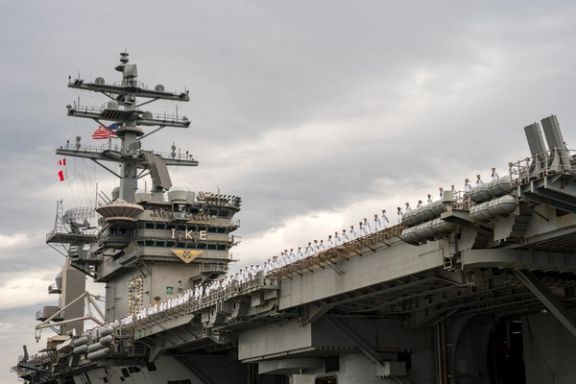US And Allies Warn Houthis With UN Backing

The Red Sea got closer to war Wednesday, as the UN Security Council asked Houthis to halt attacks on ships and the Iran-backed group exchanged threats with the US military.

The Red Sea got closer to war Wednesday, as the UN Security Council asked Houthis to halt attacks on ships and the Iran-backed group exchanged threats with the US military.
Hours before the UNSC met, 12 countries led by the United States issued a joint statement to warn the Houthis of what awaits them if they continue their “illegal, unacceptable, and profoundly destabilizing” attacks in the Red Sea.
“We call for the immediate end of these illegal attacks and release of unlawfully detained vessels and crews,” read the statement. “The Houthis will bear the responsibility of the consequences should they continue to threaten lives, the global economy, and free flow of commerce in the region’s critical waterways.”
The statement was notably reposted on X by the US Central Command, making it look like a ‘final warning’ from the force most likely to follow through on the threat.
It comes amid reports that the Biden administration may be considering direct strikes on the rebels and the US military readying options for it, in case the attacks continue.
Signatories of the statement include Germany, Japan and the UK. The only country from the Middle East to have signed the statement is Bahrain, which hosts the US Fifth Naval Fleet. The UAE and Saudi Arabia are the conspicuous absentees, weary, perhaps, of potential repercussions of getting on the wrong side of the Houthis and their sponsor Iran.
Both have maintained their belligerent tone so far.
“The Yemeni Armed Forces warn the American enemy or any other party that any American aggression will not go unanswered or unpunished,” said Houthi military spokesperson Yahya Sarea in a televised briefing Wednesday, reiterating their will to target Israel-bound vessels until “necessary supplies of food and medicine” are delivered to the people besieged in Gaza.
Houthis –funded, guided, armed by Iran– have targeted more than 30 commercial vessels in the Red Sea (and a few American warships even) since Israel began its onslaught on Gaza. As a result, 18 shipping companies have re-routed away from the Red Sea, according to a UN maritime agency report, and “more than $200 billion in trade” has been diverted from the crucial route, which leads to the Suez Canal and from there the Mediterranean Sea.
As political as the current crisis is, the decisive factor pushing the US and others towards an unwanted war with Iran and its proxies may very well be the economic burden.
According to a CNBC report Wednesday, since the start of 2024, rates for freight from Asia to northern Europe and North America have increased around 100% and 60% respectively. The hike in the cost of shipping will push up the price of consumer goods –or the ‘cost of living’, which scares most governments.
It is partly the reason why President Biden has allowed Iran to sell oil in spite of sanctions: to keep US fuel prices low as he bids for reelection later in the year. But his policy seems to have had the opposite effect: emboldening the Iranian regime and its proxies to effectively close the Red Sea and disrupt global trade.
Even China is alarmed by the disruption of maritime trade.
“China is concerned about the repeated incidents of attacks and seizures of merchant ships in the Red Sea,” said the Chinese representative at the UN Security Council Wednesday. “China also urges the parties to respect and guarantee the freedom of navigation for all countries in the waters.”
More notably, however, the Chinese mission highlighted the link between Houthi attacks and the ongoing Israeli onslaught on Gaza.
“The current tensions in the Red Sea are one of the manifestations of the spillover effects of the conflict in Gaza,” said Geng Shuang, deputy permanent representative of China to the UN, tacitly countering Israel’s argument at the same session that the Houthi threat in the Red Sea is not Israel's problem.